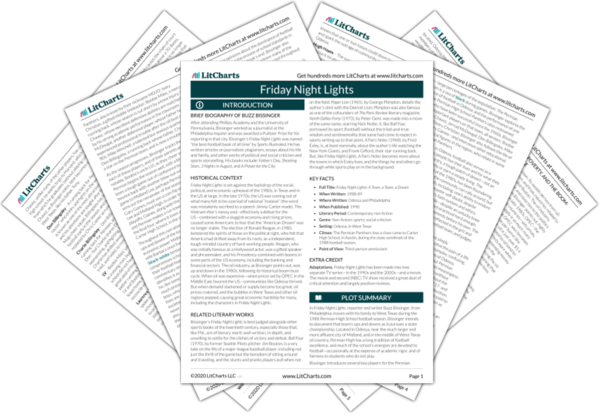Summary
Analysis
Bissinger describes the “Watermelon Feed,” an annual August event that officially kicks off the Permian season. Hundreds of fans show up at the high school, dressed in black Permian gear, to buy the official football yearbook and get a chance to meet the players on this year’s team. Bissinger talks to fans in attendance, who claim that this team is especially talented, and deserving of a state championship.
The Watermelon Feed begins a series of ceremonial activities, designed to ramp up excitement for the team. Bissinger’s description of the event—at which most of the town is present—seems hard to believe, but he goes on to show that the cafeteria is entirely full, even to overflowing, with fans and well-wishers. High School Football holds a central place in the town.
Themes
Bissinger describes an incident earlier in the eighties, which some Permian fans still grumble about. Ross Perot, then appointed as a special educational adviser to the governor of Texas, used Odessa as an example of a “football crazy” community, one that spends millions on a new stadium but reserves little money for academic improvements to the school. Permian supporters argue that football is central to the town’s identity, that it brings people together, and that no one, not even Ross Perot, should be able to tell Permian High how to spend its money, so long as Permian meets certain state minimums for academic performance—which it often does just barely.
Here, Bissinger traces a strange moment in West Texas political history, wherein Ross Perot, typically viewed as a beloved son of Texas and the South generally, “turns against” his community, and argues that football takes up too much space in the public consciousness. Bissinger thus demonstrates that football in the region is not without its detractors—although the response among Permian fans is usually to discredit, immediately, anyone who claims the fan base is too enthusiastic and single-minded in its support of the team.
Themes
Bissinger then describes the Pepettes, the official cheer squad for the Permian Panthers, who are also in attendance at the Watermelon Feed. The Pepettes don’t just cheer for the Panthers on the field; they also make special signs for their assigned players, and give little gifts to the players during the week, to boost their morale. Although attempts have been made recently to make the requirement for the Pepettes a little less demanding—namely, that gifts no longer have to be delivered to players’ homes—the Pepettes are still eager to demonstrate their devotion to the team and to Permian High.
The gender politics of Permian High are thus laid out: Bissinger seems to question, subtly, whether it is reasonable for young women to devote themselves so obviously to a given player on the football team. But the Pepettes run deep in the town, nearly as deep as the football team—Bissinger notes, throughout the book, that several mothers of current players were themselves Pepettes when they were in high school.
Themes
Bissinger describes former player Shawn Crow, who is in attendance at the Feed. Crow is considered a hero for his comeback performance at running back in the 1987 season. Crow helped score the touchdown that allowed Permian to advance to the state semis, where they eventually lost to Plano. Crow played the game with a herniated disc, which caused him to miss his first season at TCU, where he was admitted. Although the Permian coaches thought Crow was just “whimpering” about his serious injury during the 1987 season, they now praise his sacrifice. Crow seems to accept his injuries as a part of football.
Crow’s injuries from football will follow him for the rest of his life, as Bissinger here, and elsewhere, implies. Although Bissinger spends relatively little time describing the long-term health effects of playing football, he nevertheless insinuates that playing football damages players’ bodies, and even brains. This anecdote also shows how the pressure to win affects both coaches views of their players and affects the choices that players make about putting their bodies in danger, even at their young age in high school.
Themes
Get the entire Friday Night Lights LitChart as a printable PDF.

At the Feed, the 1988 Permian Panthers, almost all seniors, are introduced, to shouts of MOJO in the crowd. Although some players, like Winchell, seem uncomfortable in the spotlight of the Feed, others, like Boobie, soak in the applause of the fans. Boobie seems excited to pick up at running back where Crow left off the year before. Boobie vows, to himself and the team, that he will perform like a star for Permian this season.
For Boobie, there can be no event more exciting than the Watermelon Feed, which is designed to direct attention toward the players. But Boobie seems to want even more attention than he is given—and he believes he deserves it, based on his performance on the field last year. At this point in the book, the Permian fans, too, are excited about Boobie’s potential for the ’88 season.
Themes












